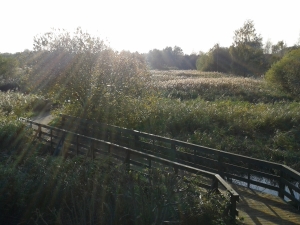It was too sunny and warm to sit at a desk writing, so I took bicycle and binoculars and went along the Thames path to the Wetland Centre. Even in a T-shirt it was warm work, feeling more like an English July (ok, that’s not saying much) than the last day of November .

Inside the Centre I passed some diminutive witches and warlocks: they seemed to be sweating uncomfortably inside their costumes. I took a swig of water and cooled off in a hide; two rare migrants, Green Sandpipers, bobbed daintily at the end of one of the little islands, dwarfed by a Black-Headed Gull and a Moorhen, neither of them particularly large birds. Their habit is not unlike that of the Common Sandpiper, but they lack the white streak that rises in front of the wing. One of them took flight, its slender dark wings and white belly giving it something of the look of a rather large and clunky House Martin. It felt very odd to be watching autumn migrants on such a summery day.
Over at the wader scrape, a Little Egret strutted and once fluttered across the shallow water; it is an uncommon visitor here, though becoming more usual along the south coast marshes and estuaries.
A Green Woodpecker bounded over the grazing marsh in its distinctive undulating flight, its red cap and green body showing beautifully in the hot sunshine, with a loud laughing call in case anybody was in any doubt what it was.
A Cetti’s Warbler sang its bold short song, Chwit-i-pit-i-pit, Chwit-i-pit-i-pit, as usual invisible deep in a reedbed.
Out on the open water, numbers of winter ducks are (oddly, given the summery weather) building up; several Shovelers dabbled; some dozens of Wigeon grazed; a few Teal, the drakes in glorious colour, swam nimbly about with some Gadwall.
Even on the way home, I had no need of a pullover. The BBC weather report confirmed what everyone instinctively knew: it was the warmest 31st of October ever recorded in Britain, with an astonishing 23.6 Celsius in London. Of course, a cold front is forecast.
P.S. The next morning was grey and rainy, autumn on the way. Two large grey Mistle Thrushes flew overhead, rasping out their wintry calls, like a boy blowing over a comb covered in tracing paper.
P.P.S. Four days later, after a clear starry night, the sun rose over a chilly town on a fine November morning. It was winter.
